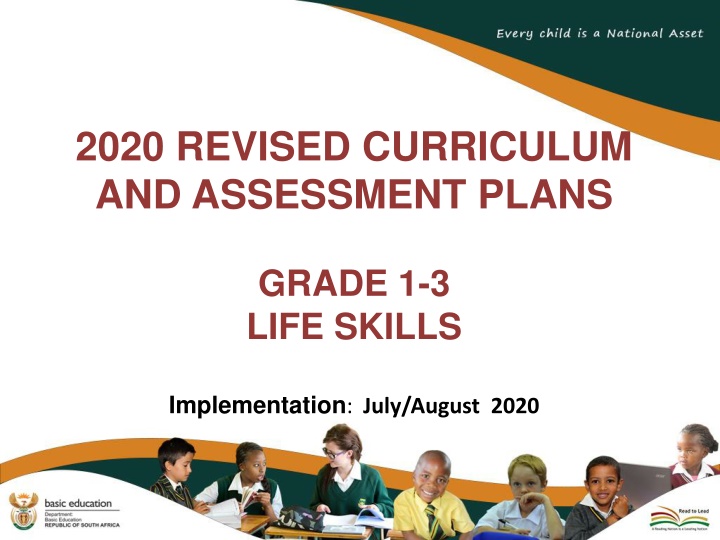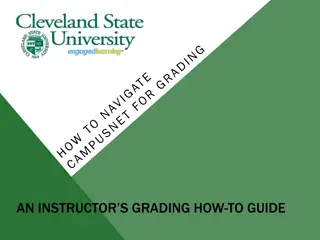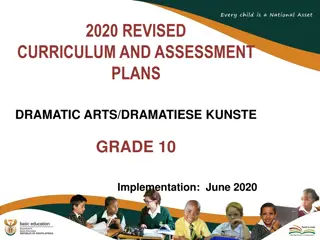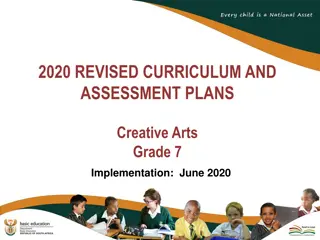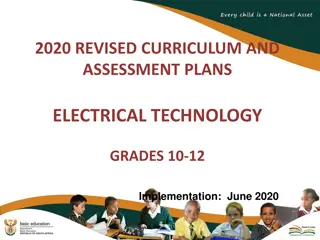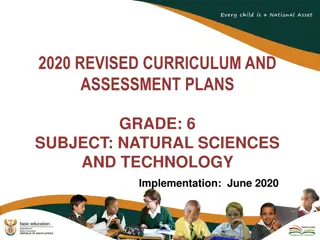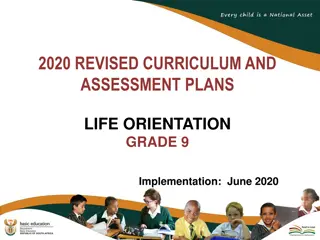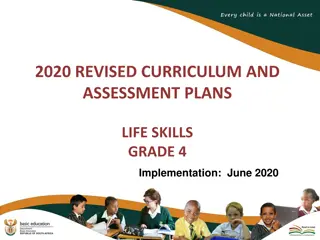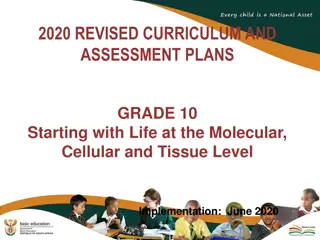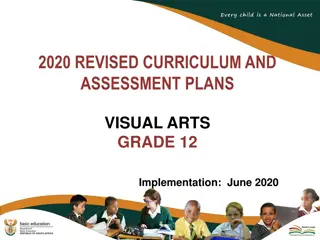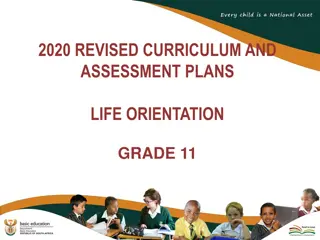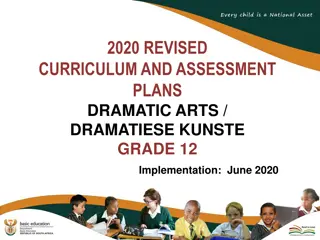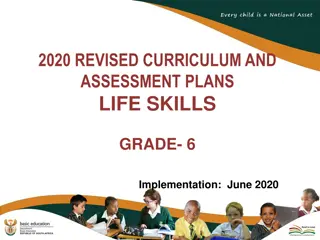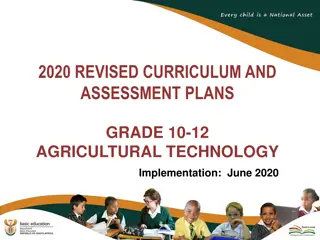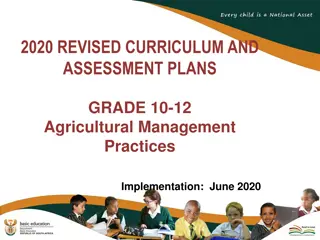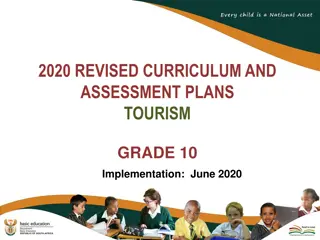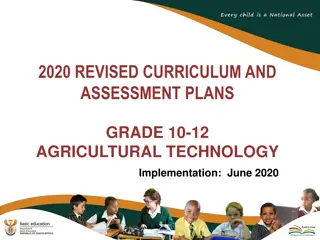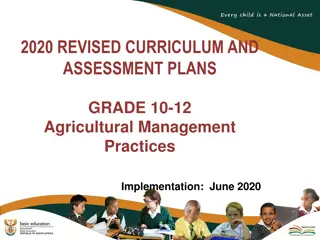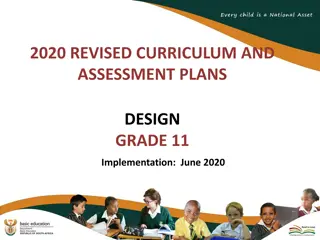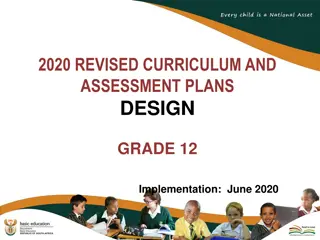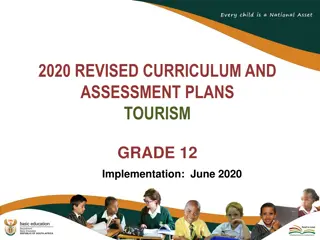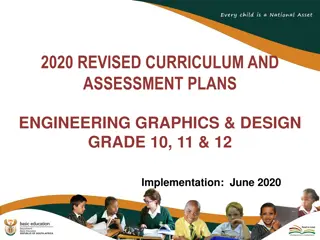2020 Revised Curriculum & Assessment Plans for Grades 1-3 Life Skills
Addressing social distancing, healthy habits, and holistic learner development, this curriculum emphasizes social and emotional health, relationships, values, and attitudes. The content spans various topics across different terms for each grade, ensuring a comprehensive education that prepares students for the future.
Download Presentation

Please find below an Image/Link to download the presentation.
The content on the website is provided AS IS for your information and personal use only. It may not be sold, licensed, or shared on other websites without obtaining consent from the author.If you encounter any issues during the download, it is possible that the publisher has removed the file from their server.
You are allowed to download the files provided on this website for personal or commercial use, subject to the condition that they are used lawfully. All files are the property of their respective owners.
The content on the website is provided AS IS for your information and personal use only. It may not be sold, licensed, or shared on other websites without obtaining consent from the author.
E N D
Presentation Transcript
2020 REVISED CURRICULUM AND ASSESSMENT PLANS GRADE 1-3 LIFE SKILLS Implementation: July/August 2020
Presentation Outline 1. Purpose 2. Amendments to the Content Overview for the Phase; 3. Amendments to the Annual Teaching Plan; 4. Amendments School Based Assessment (SBA) 5. Conclusion
1. Purpose To mediate the amendments of the revised Annual Teaching Plan 2020 including School Based Assessment for Life Skills in Grades 1-3 for implementation in June 2020 as stipulated in Circular S2 of 2020. To ensure that meaningful teaching proceeds during the remaining teaching time as per the revised school calendar. To assist teachers with guided pacing and sequencing of curriculum assessment. content and
1. Purpose (continued) To enable teachers to cover the essential core content /skills in each grade within the available time. To assist teachers with planning for the different forms of assessment. To ensure learners are adequately prepared for the subsequent year/s in terms of content, skills, knowledge, attitudes and values.
2. Amendments to the Content Overview for the Foundation Phase
Subject: Life Skills During this phase and addressing the importance of social distancing and staying healthy, Life Skills will address social health, emotional health and relationships with other people and our environment, including values and attitudes. Holistic development of the learner and keeping them grounded, is key. Disinfection and social distancing are strict requirements which will be adhered to in preventing the spread of COVID 19.
Grade Topics across Term 2 to 4 GRADE 1 WEEK 1 WEEK 2 WEEK 3 WEEK 4 WEEK 5 WEEK 6 WEEK 7 ORIENTATION MY FAMILY MY COMMUNITY ORIENTATION MY FAMILY SAFETY IN THE HOME KEEPING MY BODY SAFE KEEPING MY BODY SAFE TOPICS: TERM 2 MY BODY MY BODY MANNERS AND RESPONSIBILITY PLANTS AND SEEDS TOPICS: TERM 3 MY COMMUNITY PETS FOOD FOOD THE SKY AT NIGHT THE SKY AT NIGHT TOPICS: TERM 4 HOMES HOMES PICTURE MAPS WATER WATER GRADE 2 WEEK 1 WEEK 2 WEEK 3 WEEK 4 WEEK 5 WEEK 6 WEEK 7 CREATURES THAT LIVE IN WATER ROAD SAFETY CREATURES THAT LIVE IN WATER PEOPLE WHO HELP US TOPICS: TERM 2 ORIENTATION SEASONS ORIENTATION SEASONS FARM ANIMALS WILD ANIMALS ANIMAL HOMES SOIL WORKING WITH SOIL TRANSPORT BY LAND: LAND/RAIL TRANSPORT BY AIR/WATER PEOPLE WHO HELP US TOPICS: TERM 3 DIFFERENT WAYS OF COMMUNICATI NG WEEK 4 TOPICS: TERM 4 NATIONAL ANTHEM AND COAT OF ARMS COMMUNICATI N WITHOUT SIGHT/HEARING OUR COUNTRY SOUTH-AFRICA NATIONAL SYMBOLS ANIMALS OF THE NIGHT DAY AND NIGHT GRADE 3 WEEK 1 WEEK 2 WEEK 3 WEEK 5 WEEK 6 WEEK 7 ORIENTATION HEALTHY EATING TOPICS: TERM 2 HEALTHY EATING INSECTS INSECTS LIFE CYCLES RECYCLING RECYCLING HOW PEOPLE LIVED LONG AGO DISATERS AND WHAT WE SHOULD DO CONSOLIDATIO N OF TOPICS CONSOLIDATIO N OF TOPICS TOPICS: TERM 3 PUBLIC SAFETY PUBLIC SAFETY POLLUTION SPACE SPACE PRODUCTS AND PROCESSES PRODUCTS AND PROCESSES DISATERS AND WHAT WE SHOULD DO ANIMALS AND CREATURES THAT HELP US ANIMALS AND CREATURES THAT HELP US TOPICS: TERM 4
Summary: Amendments to the Content Overview for the Foundation Phase Life Skills Beginning Knowledge and Personal Social Well-being (BKPSW) Beginning Knowledge and Personal and Social Well- being in the Life Skills curriculum are organised in the given CAPS topics. Creative Arts Physical Education Grade 1 Grade 2 Grade 3 Visual Arts: allow learners to use their own apparatus or alternatively use the apparatus in groups on different days to allow for sanitizing. Activities have been adapted to ensure that Physical Education takes place so that learners develop perceptual and other skills Orientation to take place in week 1 but learners should be conscientised about these EACH day All equipment to be sanitized after every use. Limit activities with resources that can spread the virus. Adhere daily to COVID-19 measures. Performing Arts: Activities have been adapted to ensure safety. use learner own space social distancing All equipment to be sanitized after every use. Social distancing, washing of hands and wearing of masks Adhere daily to COVID-19 measures: Maintain social
Summary: Amendments to the Content Overview for the Life Skills study areas BKPSW Creative Arts Physical Education Grade 1 to 3 The first week s orientation topic of re-opening is merged with the COVID 19 information. CAPS content has been spread across the weeks Creative and Performing Arts CAPS trimmed content available and the proposed content to teach per week/topic are specified with a X in each grade. Physical Education trimmed skills and content are presented to teach per week/topic and indicated with a X in each grade. The extra time derived from Physical Education due the trimming of activities were integrated with Home Language components. Read BKPSW fiction and non-fiction texts
3. Amendments to the Annual Teaching Plan
Annual Teaching Plan The work for term 2, 3 and 4 has been re- organised and spread over the given weeks. The teacher (per Grade) must record what she has completed on a week by week basis. A common template can be used for this purpose.
Summary: Reorganisation of content topics Knowledge, skills, values, and attitudes within each Life Skills study areas were reorganised and incorporated into the COVID 19 curriculum trimmed document. The content is therefore mapped out for each subject and grade, setting out the knowledge, skill and content to be covered per week and per term It sets the foundation for integration for Home Language
Summary: Amendment to the weighting of content topics Deviations to the time allocation ( 1 hour) in Life Skills (Physical Education) in all grades and integrated with Home Language. BKPSW reading fiction and non- fiction texts for Read aloud, shared or individual reading, read for comprehension and writing e.g. Write a story about a process, poem, oral etc.
Summary: Content/Topics Amended Content/Topics Term Amendment The use of materials and LTSM COVID 19 restrictions and healthy practices integrated with the activities Creative Arts 2, 3, 4 Physical Education sessions is included for indoor movement within learners space on or in front of their chair for 12 minutes per day (1 hour per week). If space allows, in demarcated areas outside. COVID 19 restrictions integrated with the activities Physical Education 2, 3, 4
4. Amendments School Based Assessment (SBA)
SCHOOL BASED ASSESSMENT Assessment for and of learning will continue to be implemented on a continuous basis in Life Skills.
Summary: Revised Programme of Assessment Term 1 Term 2 Term 3 Term 4 One formal assessment task to be completed. 1 activity per Study Area One formal assessment task to be completed. 1 activity per Study Area Informal observations Continuous formative assessment Continuous formative assessment Continuous formative assessment
Summary: Revision Final Examination Structure One formal assessment task to be completed per term One activity per Study Area during teaching and learning after multiple opportunities
Summary: Revised Practical Assessment Task (PAT) Not applicable to Foundation Phase.
Conclusion Life Skills is the vehicle to develop learners holistically and address psycho social support. It keeps learners grounded and provides a safe space where learners sing, dance and do movement. Whilst it develops important skills as a foundation for learning, it provides an outlet and is therapeutic. The importance of Life Skills must be consciously considered daily
Conclusion It is still possible to cover all the study areas in Life Skills in the Foundation Phase as the subject is the backbone of teaching and strengthening Home Language Although Life Skills is not used for progression purposes in the Foundation Phase, the foundational skills are important as it is progressively developed; holding tools, spatial orientation, reading, writing, Science and Technology in Intermediate Phase. Skills can further be strengthened in 2021 when the learner progresses to the next grade. The Foundation Phase teacher will be able to cover the curriculum during this exceptional time.
Conclusion Create a safe, friendly, stable, loving environment for our learners. Teachers are to be mindful of the following: o Learners could be traumatized due the impact of the COVID 19. o A positive, self-confident learner before the lockdown, can now display feelings of insecurity and changed behavioural patterns o Some may have family members/friends who were/are affect o Learners may experience separation anxiety from parents/caregivers. Foundation Phase teachers have a critical role play. Be observant and offer psycho - social support at classroom/school level Next level support to be put in place for urgent intervention
Contact Details Name: Director GET Department of Basic Education Tel: 012 357 4140 Email: modiba.k@dbe.gov.za
